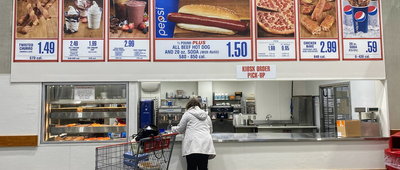"Let's promise," 6-year-old me solemnly proposed to my father, "that we'll never use coffee, tea, tobacco, alcohol, or drugs. Let's pinky swear."
Most fathers wouldn't make such a sweeping promise, but most fathers aren't Mormon. Mine is. "That's a great idea, sweetie," he said. He hadn't ever touched any of those things anyway and was proud that I was committing to be an obedient Mormon.
Related: I Banned Sugar From My Diet for a Week and Here's What Happened
The Revelation
In Mormonism, there is something called the "Word of Wisdom," what Mormons say was a revelation to their founder Joseph Smith from God. It is a strictly enforced health code that all Mormons must follow to be allowed to fully participate in the religion's rituals and worship services. The Word of Wisdom has pleasant, helpful advice like eating food in season and avoiding meat unless it's necessary, but that part isn't enforced, and most Mormons consider it more interesting advice than God's law for them, despite it having been given in the same code.
When a Mormon is asked by their leaders if they're keeping the Word of Wisdom (which they frequently are), they are being asked if they drink coffee, tea, or alcohol, or use tobacco or illegal drugs. Abuse of prescription drugs certainly isn't encouraged, but theoretically, drinking coffee could get you in more trouble with your local church leaders than abusing Xanax. The Word of Wisdom technically bans "hot drinks," which when it first came out was taken to mean that obviously hot soup and hot chocolate were banned by God as well. Now, Mormons very happily eat hot soup and drink hot chocolate at the same alarming pace that they drink other sugary drinks, but coffee and tea are still banned. In fact, it's just seen as having been that way all along.
Gray Matters
When I started drinking green tea at Brigham Young University, the Mormon-owned college in Provo, Utah, I had mixed feelings. Sure, my fellow students mainlined Diet Coke and energy drinks without pause (those weren't banned by God in 1833) to get through finals, but I also wanted to obey God's law as carefully as I could. When my mother learned that I was drinking green tea, she was disappointed. She prayed for me. She counseled me to be more obedient to God's laws.
A bit worried, I scheduled a meeting with my bishop. Bishops are the unpaid leader of each Mormon congregation (called a "ward") and manage the worship services each week, but also are responsible for giving spiritual guidance to their congregants.
I explained the issue to my bishop — it was the winter and I was tired, and my classes felt like they were getting the best of me. Having a few cups of green tea a day made me feel more focused and energized. It seemed much healthier than caffeinated soda. Plus, there probably wasn't much green tea in the U.S. when Joseph Smith received the Word of Wisdom revelation for God, so maybe God was just banning black tea at the time, and since green tea is healthier, it is OK?
My bishop listened to me, and then was quiet for a bit.
"Well, it's not a great habit to get into. I think you're right that it's a gray area, and it's always best to avoid gray areas when we can, especially when it comes to obeying the Lord's commandments. But, if you don't find that it's negatively affecting your health and have prayed about it and still feel okay about it, I think that's up to you and the Lord."
I kept drinking green tea but tried to be more careful about it. I avoided it when I could, and tried to just pull out my stash for big occasions like finals or midterms. Only when God couldn't fault me.
A Professional Conundrum
In my junior year of college, I moved to New York for the semester to intern at a food magazine. I was thrilled to taste and learn in one of the best food cities in the world. What I quickly learned, though, was that tasting meant tasting drinks, too. For my new friends and colleagues, enjoying food meant enjoying wine (or beer or cider or cocktails) right along with it.
One of the tenets of Mormonism is that we are on earth to learn and to grow — that we are God's children, specifically sent to mortality for that purpose. I'm happiest as a student, and that teaching has always resonated with me. There's also the teaching that beauty is a reminder of God's love for us, and of his desire for us to find authentic happiness.
Here I had one of the best food-learning opportunities to be found, and God wanted me not to learn about the beauty, culture, art, and science of alcohol? Something that monks and farmers and the ancients had crafted for longer than Mormonism had existed?
So, I decided to taste the beverages that I was offered — if it felt like I'd learn from them — and spit them out after. I had seen wine tasters spit into buckets so as not to get drunk at a noon work tasting and figured the same principle could be applied to other beverages as well. A tiny sip, then a spit.
The entirety of my internship, I sipped and spat. I returned to Provo and continued my studies.
A Personal Conundrum
Mormonism, however, had started to wear on me. I didn't like that, because marriage was idolized, my 19-year-old female friends felt pressure to be married in the next year or two, and did so to men they had sometimes only known for a few months. I didn't like that, because dating was urged by church leaders and professors, young women felt pressure to attain some sort of beauty ideal, and often fell into eating disorders because they felt inadequate.
I also didn't like that we were urged to donate and work on the Prop 8 campaign, on the side of stripping rights from some of my LGBTQ friends. I didn't like that those friends had to hide who they were and who they loved at BYU at the risk of being kicked out of the university. (They initially had signed up, thinking that if they were obedient enough to God, that he'd take away their gayness. Quite the opposite.) It felt much more like the policies of old, white, conservative men, than those of a loving Heavenly Father (theoretically, there was a Heavenly Mother, too, but no one talked about her).
One Saturday morning, I decided to have a sip of my friend's mimosa at brunch. Then, I ordered my own. I felt light and free. Later, when I got home, I felt dark and guilty for having so blatantly broken another of God's laws.
Learning to drink without having ever learned anything about how to drink is hard. I was an au pair in the Netherlands one summer, and the woman I worked for (who knew I was Mormon) was aghast when I put a bottle of Cabernet Sauvignon in the fridge next to the milk. How was I supposed to know? Little things, like learning how to open a bottle of wine, were huge accomplishments. Bigger things, like learning my limits and not to drink when I was nervous, afraid or ashamed, were vital.
Finding Meaning — and Peace
But, I kept learning. I explored new wines, I talked to people who worked in wine, and I read everything I could. I started a career in cheese and taught classes with wine professionals on pairing wine and cheese. I started to know more than my friends, and then sometimes, knowing more than the wine instructors opposite me. I started teaching the wine side of Wine & Cheese 101.
Eventually, I was asked by an editor friend to write an article on wine. I did. I wrote more. I kept writing. Now, I write about wine and am that friend who people ask for wine advice.
I broke my childhood promise to my father. My religion and I have a complicated relationship. But, wine offers me the opportunity for constant learning and beauty, and I find an immense amount of meaning from it.

 Photo credit: Brycia James/istockphoto
Photo credit: Brycia James/istockphoto Photo credit: PredragImages/istockphoto
Photo credit: PredragImages/istockphoto Photo credit: IrisImages/istockphoto
Photo credit: IrisImages/istockphoto Photo credit: Giuseppe Lombardo / EyeEm / Getty Images CC
Photo credit: Giuseppe Lombardo / EyeEm / Getty Images CC






